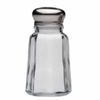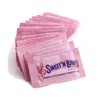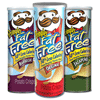We all know our food ingredient labels are riddled with words that require an advanced degree to understand. Most of us bypass reading them because it’s easier. However, buried in those multi-syllabic words are chemical additives that can have an adverse effect on our health and how are bodies absorb nutrients. These chemical ingredients increase a food’s shelf life, enhance their flavor and color, and make them all-around more appealing to consumers. Packaged food manufacturers and fast food or dine-in restaurants use them (consider this 5-month-old hamburger from McDonald’s that has not varied in appearance at all). Use this list as a guide of eight chemical additives you should avoid.
Remember, as our pal Chef Rocco from Biggest Loser advises- shop the perimeter of your grocery store because that’s where all the unprocessed foods are stocked. Eat a diet rich in fresh produce, whole grains, lean proteins and fish and low-fat dairy and your body will thank you.
1. Trans Fat
 This additive has garnered much attention recently, and popular trainer Jillian Michaels noted that its the one thing she’d completely remove from grocery stores if she could. Noted on food ingredient labels as “Partially Hydrogenated Oil or Vegetable Oil,” consuming this can be detrimental to your health by promoting poor cardiovascular health and premature heart attacks. Read your labels closely, a food containing <.5g of trans fat per serving is permitted to list zero grams on its label (like Special K Bars).
This additive has garnered much attention recently, and popular trainer Jillian Michaels noted that its the one thing she’d completely remove from grocery stores if she could. Noted on food ingredient labels as “Partially Hydrogenated Oil or Vegetable Oil,” consuming this can be detrimental to your health by promoting poor cardiovascular health and premature heart attacks. Read your labels closely, a food containing <.5g of trans fat per serving is permitted to list zero grams on its label (like Special K Bars).
Culprits: Fried Food, Restaurant Food, Microwave Popcorn, Margarine, Crackers, Chips, Packaged Cookies and Cakes
2. Salt/Sodium
 It’s possibly one of the most dangerous additives in our food supply. Everyone from food manufacturers, restaurant chefs and dear old mom use it in nearly everything we eat and drink. Whether used as a preservative or to enhance or better the flavor, foods high in salt/sodium pose a great risk to our cardiovascular health. The recommended daily allowance for sodium is 2,400 mg, or 1 tsp. of table salt, per day. Fast food meals like McDonald’s Grilled Chicken Ranch BLT combo (~1785 mg Sodium), can contain close to, if not more, than an entire day’s worth of sodium.
It’s possibly one of the most dangerous additives in our food supply. Everyone from food manufacturers, restaurant chefs and dear old mom use it in nearly everything we eat and drink. Whether used as a preservative or to enhance or better the flavor, foods high in salt/sodium pose a great risk to our cardiovascular health. The recommended daily allowance for sodium is 2,400 mg, or 1 tsp. of table salt, per day. Fast food meals like McDonald’s Grilled Chicken Ranch BLT combo (~1785 mg Sodium), can contain close to, if not more, than an entire day’s worth of sodium.
Culprits: Fast Food, Deli Meats, Canned Goods, Crackers, Chips, Processed/Packaged Foods
3. Artificial Coloring
 Typically found in foods that are already not providing any nutrition, it’s best to just stay away from anything with artificial colors. The dyes are just a chemical- so they contain no vitamins, minerals or other nutrients. Read food labels closely, and be especially cautious of those listing Blue 1, Blue 2, Green 3, Red 3, Yellow 6- all of which have been linked with various tumors and cancers.
Typically found in foods that are already not providing any nutrition, it’s best to just stay away from anything with artificial colors. The dyes are just a chemical- so they contain no vitamins, minerals or other nutrients. Read food labels closely, and be especially cautious of those listing Blue 1, Blue 2, Green 3, Red 3, Yellow 6- all of which have been linked with various tumors and cancers.
Culprits: Soda, Candy, Juice, Packaged Baked Goods, Frosting, Gelatin, Fruit Cocktail, Sausage
4. Saccharin
 Much sweeter than sugar, this artificial sweetener made it possible for dieters to enjoy the foods they love. In recent years, aspartame has taken its place and hasn’t been looked at as negatively. Saccharin has been considered for ban by the FDA, and is linked with multiple types of cancers in many studies. It’s a man-made chemical and again, promotes nothing nutritious within your body. It should be avoided wherever possible.
Much sweeter than sugar, this artificial sweetener made it possible for dieters to enjoy the foods they love. In recent years, aspartame has taken its place and hasn’t been looked at as negatively. Saccharin has been considered for ban by the FDA, and is linked with multiple types of cancers in many studies. It’s a man-made chemical and again, promotes nothing nutritious within your body. It should be avoided wherever possible.
Culprit: Diet Soda, Sweetener Packets, Sugar-Free Food Products
5. Diacetyl
 That buttery flavor you love can usually be attibuted to this chemical ingredient. In 2024 it caught much publicity for being the responsible party behind “popcorn lung,” causing lung disease in the workers at microwave popcorn factories. That publicity fortunately caused it to be removed from most foods, but still worth examining your food labels to see if its lurking.
That buttery flavor you love can usually be attibuted to this chemical ingredient. In 2024 it caught much publicity for being the responsible party behind “popcorn lung,” causing lung disease in the workers at microwave popcorn factories. That publicity fortunately caused it to be removed from most foods, but still worth examining your food labels to see if its lurking.
Culprit: Microwave Popcorn, Butter-Flavored Anything
6. Olestra
 Proctor & Gamble went out and created its own fat, and its brand name is Olean. When first created, it was promoted as not only being a fat you could eat, but a fat that would help you lose weight. It is added to typically greasy junk food snacks so that dieters can enjoy them, too. Olestra was quickly found to cause severe gastrointestinal and digestive issues because it is indigestible. It also inhibits the body’s ability to absorb nutrients like beta-carotene and lycopene found in fruits and vegetables.
Proctor & Gamble went out and created its own fat, and its brand name is Olean. When first created, it was promoted as not only being a fat you could eat, but a fat that would help you lose weight. It is added to typically greasy junk food snacks so that dieters can enjoy them, too. Olestra was quickly found to cause severe gastrointestinal and digestive issues because it is indigestible. It also inhibits the body’s ability to absorb nutrients like beta-carotene and lycopene found in fruits and vegetables.
Culprit: Pringles Light, Lay’s Light
7. Sodium Nitrite or Nitrate
 You might have heard people say they avoid nitrates, and this is what they’re talking about. This chemical additive gives “cured meats” that salty flavor, and maintain their reddish tint. As an example, your hot dogs and bacon would be a grey color without it. Manufacturers say its use is important to prevent bacteria growth, critics suggest modern refrigeration does the same thing. This additive has been linked with cancers in children and adults.
You might have heard people say they avoid nitrates, and this is what they’re talking about. This chemical additive gives “cured meats” that salty flavor, and maintain their reddish tint. As an example, your hot dogs and bacon would be a grey color without it. Manufacturers say its use is important to prevent bacteria growth, critics suggest modern refrigeration does the same thing. This additive has been linked with cancers in children and adults.
Culprits: Ham, Hotdogs, Bacon, Canned Meats/Fish, Corned Beef
8. Potassium Bromate
 It is likely you won’t find this additive in your bread goods, but be sure to glance at the label anyway. The U.S. is one of only two countries in the world who have not banned its use (Japan being the other). Bromate can be used to give bread more volume and a better structure. It has been linked to causing cancer in animal studies.
It is likely you won’t find this additive in your bread goods, but be sure to glance at the label anyway. The U.S. is one of only two countries in the world who have not banned its use (Japan being the other). Bromate can be used to give bread more volume and a better structure. It has been linked to causing cancer in animal studies.
Culprits: White Flour Bread/Grain Products

You have some excellent advice, but I would suggest you also eliminate the other two food dyes: Red 40 and Yellow 5; these are the most widely used of the dyes and also cause many problems. All of the dyes are made from petroleum and most of them originate in petroleum refineries in China.
Of all the synthetic sweeteners, aspartame has been reported as causing the most problems for the most people. In fact, it is the additive that has generated the majority of adverse reaction reports to the FDA. While saccharin is not a good idea, it is less likely to cause reactions than the other synthetic sweeteners. Of course, stevia is the best choice for a no-calorie sweetener.
The items eliminated by the Feingold Program are somewhat similar to your list. The program removes: synthetic food dyes, artificial flavors, aspartame and other synthetic sweeteners, three petroleum-based preservatives (BHA, BHT, TBHQ).
Many families using the Feingold diet also remove: corn syrup and high-fructose corn syrup, MSG and its many clones, sodium benzoate, calcium propionate, and nitrites.
There is lots of good information at feingold.org.
Jane Hersey, director
Feingold Association of the US
I love this site
This is great advice. I’ve been trying to convince my fiend to stop eating things high in salt for a long time. Hopefully this article will convince her. ….Love your site btw!
L.N.
Another insightful tip – I have been checking back here for a while now and wanted to let you know that I am a long time reader – first time commenter! Best wishes for the future and thanks again for the breast cancer giveaway you are doing this month!
Doris Mayer
One of the worst things, which you didn’t have on your list is HIGH FRUITOUS CORN SYRUP !! This is responsible for metabolism disorders, “muffin” middles and liver disorders, bad stuff!!
JUICE JUICE JUICE! lol sorry, but this won’t stop me from drinking my delicious juice.
Audrey, I agree that high fructose corn syrup is a terrible additive. You can see our nutritionist’s report on High Fructose Corn Syrup where she goes into more detail about the negative effects.
Whoever compiled this list has obviously not done his/her/their homework…
Saccharin, while tasting nasty IMO, has never been conclusively linked to cancer. The motion to consider banning was withdrawn in 1991, and product warning labels were repealed in 2000, as the original cancer links were flawed.
Diacetyl is a natural ingredient found in – are you sitting down? – BUTTER! It is also found naturally in other food sources as a by-product of fermentation. There has been no evidence that eating anything with diacetyl in it causes harm. The “popcorn lung” disease is a result of workers inhaling airborne diacetyl fumes, NOT ingestion! Might as well tell people not to use window cleaner containing ammonia or put gas in their vehicles. So unless you are regularly “huffing” bags of microwave popcorn (air-popped is MUCH healthier, BTW – oh look, some USEFUL dietary advice!), diacetyl hasn’t been shown to cause any harm to average consumers.
Olestra was found by the FDA to have low incidence and severity of the abdominal problems, as listed. Hence they removed the warning label requirements stating such in 2003. Fat-soluble nutrients are blocked by any insoluble fat, including fat not absorbed when taking Alli or Xenical (and those medications are approved and they DO cause more severe digestive problems!) As such, anything made with Olean is required to add additional nutrients to help account for what would be lost from a normal daily intake.
Hey guess what? I’m not a dietician, but I can read! I would suggest any columnists on a diet website do the same, and back up your “opinons” with legit research.
all this stuff is in our kids’ school lunches. doesn’t anybody care?
Great list – thanks for the write up!
The Food-Nazi’s are at it again attempting to scare us with propoganda that has very little legitimate scientific value. They won’t be happy unless we hate eating or fear every bite. Go away boogeymen and women. People have consumed these items for many, many years but thier is no plauge of death you would have us believe will happen if we eat foods we enjoy.
Oh, by the way, the article sucked.
Thanks for the feedback Ben. There’s so much information in the marketplace regarding all of these products that even with our expert team’s thorough research, people are going to dig up something that states the contrary.
And it goes like that with any topic, say one camp stating a low-carb diet is unhealthy and the opposing camp stating a low-carb diet is healthy. Right now the Corn Refiners Association is running a nationwide campaign telling people that High Fructose Corn Syrup is natural and just as safe for them as sugar… but the truth is it’s not.
We appreciate your comment and always welcome an open dialogue at DietsInReview.com.
Per our research, these are 8 things that aren’t doing anyone any kind of good. Food additives aren’t healthy in any light, and whenever possible, people should consume a diet rich in whole, natural foods.
Vic – the point is that this stuff HAS been in our food for years and it has NO business being there. People are lazy and refuse to read food labels, challenge our food producers to give us better quality and take everything at face value. Any one see the correlation between all of this NASTY JUNK being in our food, where in foreign societies it is not, and the EXTREME obesity epidemic in the U.S., where it is not in foreign countries???
I loved this article and glad to see someone bringing more light to the topic.
ORGANIC! GRASS-FED! WILD CAUGHT! NO PRESERVATIVES OR CHEMICALS!!
It’s unfortunate that indignant consumers of unhealthy products feel the need to -in defending their stubborn and unchanged consumption- persuade everyone else that they are right.
Chemical additives in their natural context, Ben, are usually not going to do anyone much harm, but consider the consequences of isolating them, and adding them in large amounts to all sorts of junk food we eat. And who decided butter had no unstudied health detriments besides those already known to us? Butter was never healthy to start.
For example, everyone knows that oil is generally bad for you because it is ISOLATED fat, but meat, nuts, wheat, avocados and whole sources of oil are extremely healthy because of the fiber, starches, protein, minerals, vitamins, and phytochemicals that accompany those oils. Lipids (fats) are also important for survival, and immune, and cellular function.
Vic, if your comment had any scientific backing, or logical backing I might be swayed… But alas…
Fantastic article; spot on, buddy-o.
Would you mind looking into the detriments of dairy one day? I’m considering cutting it out, but there is so much conflicting info out there.
Hey Ben
I like how all of your objections have pretty serious charges against them that they some how got off of..just look at the back of a NutraSweet package.. the point is all of these additives are just not natural and even if they existed in a natural stage at some point they were extracted and altered. I think what the editor is trying to say is that eat natural eat healthy! Ben now you can go back to lobbying in Washington for your chemically fortified foods.
– Phil
Look, we’re all trying to avoid trans fat and high sodium and Olestra nowadays, but food dyes? Honestly, how are we supposed to cut out food dyes, unless we plan on being vegan for the rest of our lives?
Gunther, I have issues with food digestion, and have recently been scouring the web a bit for help….I do find dairy to hurt me…and other things, too. A site I look at a bit is Your Digestive Health channel on everydayhealth. I now carry a supply with me of Beano (an enzyme to aid digestion in lots of things), charcoal capsules, and Lactaid Ultra. I am much improved as long as I am careful and do what I should!! Good luck!
So this basically means we can’t eat:
Fried Food, Restaurant Food, Microwave Popcorn, Margarine, Crackers, Chips, Packaged Cookies and Cakes, Fast Food, Deli Meats, Canned Goods, Crackers, Chips, Processed/Packaged Foods, Soda, Candy, Juice, Packaged Baked Goods, Frosting, Gelatin, Fruit Cocktail, Sausage, Diet Soda, Sweetener Packets, Sugar-Free Food Products, Microwave Popcorn, Butter-Flavored Anything, Pringles Light, Lay’s Light, Ham, Hotdogs, Bacon, Canned Meats/Fish, Corned Beef, and White Flour Bread/Grain Products.
That’s all well and good. But what CAN we eat? Produce is having a problem with pesticides and bacteria, apparently the cows have all gone mad, and we can’t eat any of the things listed above.
That leaves us on… what, cheese and fish? (but only the non-canned kind!)
And if you don’t like cheese or fish, I guess you just keel over and die, then?
Unless you happen to have a couple of spare acres in your back yard to farm with. Does that mean that everyone in the cities is going to be cancerous and obese?
Hi. I appreciate this list 🙂 You can also find potassium bromate on some of kraft’s packages such as their pumpkin seeds.
http://www.youtube.com/watch?v=Tx2hd6u2NQ0
this helped me wit ma hw
so thanks 🙂
I’m always amazed at people using artificial sweeteners because they are a “healthy” alternative. When you try to gently educated them, they usually respond with “If I worried about everything that was killing me, I’d be dead already! Ha Ha!”. But, it’s really not funny.